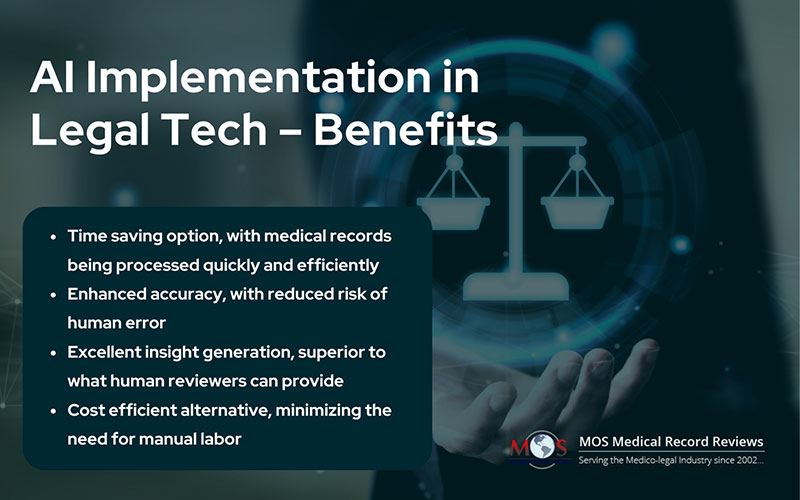In cases involving personal injury or medical malpractice, reviewing extensive medical records can be daunting and time-consuming. However, with the entry of artificial intelligence (AI), legal professionals are witnessing a transformative shift in the way medical record chronologies are handled. The challenge is that medical records are often voluminous, complex, and filled with medical jargon, making it difficult for legal professionals to extract relevant information efficiently. Manually reviewing these records can be labor-intensive, prone to errors, and can consume valuable time that could be better spent on analysis and strategy development. AI-powered tools are streamlining the medical record review process, enhancing efficiency, and ultimately improving outcomes for both legal teams and their clients.
Let MOS Medical Record Reviews help you with your medical record chronology requirements.
Ask us for a Free Trial!
Call us toll free at 1-800-670-2809.
How AI Has an Important Role to Play
AI technologies, such as natural language processing (NLP) and machine learning (ML), are revolutionizing how medical records are analyzed and interpreted. NLP algorithms can efficiently and quickly sift through vast amounts of textual data, extracting key information such as diagnoses, treatments, timelines, and correlations between events. ML algorithms categorize and organize this extracted information, and create structured chronologies that are easily maneuverable and clear for legal professionals.
Here are some of the tangible benefits offered by artificial intelligence technologies:
- Time Efficiency: AI can process medical records at a fraction of the time it would take a human, thus speeding up the review process and allowing legal teams to focus on case strategy.
- Accuracy: By reducing the risk of human error intrinsic to manual review, AI helps ensure that no decisive details are ignored, leading to more thorough and accurate analyses.
- Insight Generation: AI can recognize patterns, trends, and correlations within medical records that may not be immediately evident to human reviewers, providing valuable insights that can bolster legal arguments.
- Cost Savings: Automating the legal case chronology creation process with AI can provide significant cost savings for law firms and attorneys, as it minimizes the need for extensive manual labor.
Use the accurate legal case chronologies we provide to develop your case well.
Get a free trial now!
Call us toll free at 1-800-670-2809.
Implementation of AI in Legal Tech
Several software platforms and tools have emerged in the legal tech market, providing AI-powered solutions specifically designed to streamline the review of medical records. These platforms leverage advanced AI algorithms to extract, organize, and visualize relevant information from medical records, presenting it in user-friendly formats that facilitate efficient review and analysis.
Here are some examples of legal tech platforms that specialize in medical record review and medical case chronology preparation:
- Case text: It offers a complete legal research platform with excellent features for analyzing medical records. The AI-powered tool, “Comprehension,” utilizes natural language processing to extract key information from medical records, helping legal professionals create detailed case chronologies efficiently.
- ROSS Intelligence: ROSS Intelligence provides an AI-powered legal research platform that incorporates advanced analytics and machine learning algorithms. While primarily focused on legal research, ROSS Intelligence’s technology can also be leveraged to streamline the review and analysis of medical records, helping with legal case chronology preparation.
- LexisNexis: LexisNexis offers various tools and solutions for attorneys and their legal teams, including products specifically tailored for medical record review and analysis. Their platform integrates AI and machine learning capabilities to abstract relevant information from medical records, thereby enabling the creation of structured chronologies for legal cases.
- Relativity: Relativity is a leading e-discovery platform that includes features for processing and analyzing medical records in legal cases. Their AI-powered tools assist in data extraction, categorization, and visualization, enabling legal teams to efficiently review and organize medical information for case chronologies.
- Ever law: This is an e-discovery platform that integrates AI and predictive coding to support legal professionals in reviewing and analyzing large volumes of documents, including medical records. Their platform streamlines the process of identifying relevant information and creating chronological summaries for use in legal cases.
The above-mentioned platforms offer a range of features and functionalities customized to meet the specific needs of legal professionals handling medical-related cases, enabling them to streamline workflows, improve efficiency, and achieve better outcomes for their clients.
Ai in Legal Tech – Challenges and Considerations
AI offers enormous potential in streamlining medical case chronology, but there are still challenges and considerations that legal professionals must take note of.
- Data Privacy and Security: Ensuring compliance with regulations such as HIPAA is paramount when dealing with sensitive medical data.
- Algorithm Bias: Care must be taken to mitigate biases that may be present in AI algorithms, particularly when dealing with diverse patient populations.
- Interpretation Limitations: AI is powerful, but is not foolproof, and there may be occasions where human judgment and proficiency are still required to interpret complex medical information accurately.
AI-powered tools are revolutionizing the way medical case chronology is created and analyzed in the legal field, offering significant benefits in terms of efficiency, accuracy, and insight generation. As technology continues to develop, integrating AI into legal workflows will become increasingly essential for law firms seeking to remain competitive and deliver optimal outcomes for their clients.





